Singapore’s Top 10 Logistics and Delivery Services for Seamless Business Operations
In Singapore’s fast-paced business environment, the demand for reliable logistics and delivery services has never been greater. From e-commerce brands promising same-day shipping to B2B companies handling regional supply chains, businesses are under increasing pressure to move goods quickly, accurately, and cost-effectively.
Yet, many face mounting operational challenges—limited warehouse space, unpredictable delivery delays, rising customer expectations, and difficulties scaling during peak seasons. For instance, a local skincare start-up might struggle to keep up with online orders during holiday sales without a strong fulfilment partner. Meanwhile, a furniture retailer could face costly setbacks if their third-party transporter fails to meet deadlines. As consumer habits shift and digital commerce grows, logistics is no longer a behind-the-scenes function—it’s a competitive advantage.
This article explores the top logistics and delivery services in Singapore that help businesses stay resilient, responsive, and ready for growth. Whether you’re scaling locally or regionally, the right partner makes all the difference. Check out Becozon’s top logistics and delivery service providers in Singapore and find a solution that fits your business goals.
Verified Company
Respond in
Logistics and Delivery Services
Industry Sub-Categories
Types of Products & Services
Exploring the Benefits of Outsourced Logistics and Delivery for Singapore-Based Businesses
Logistics and delivery services help businesses get their products from one place to another—whether it’s from a factory to a store or a warehouse to your doorstep. They cover everything from storage and inventory management to transportation and final delivery. While we often only see the end result—a package arriving on time—the entire journey is carefully planned behind the scenes. These services play a key role in how businesses operate every day, ensuring customers receive their orders quickly and accurately. In Singapore, where speed and service matter, choosing the right logistics partner can make all the difference for growing businesses.
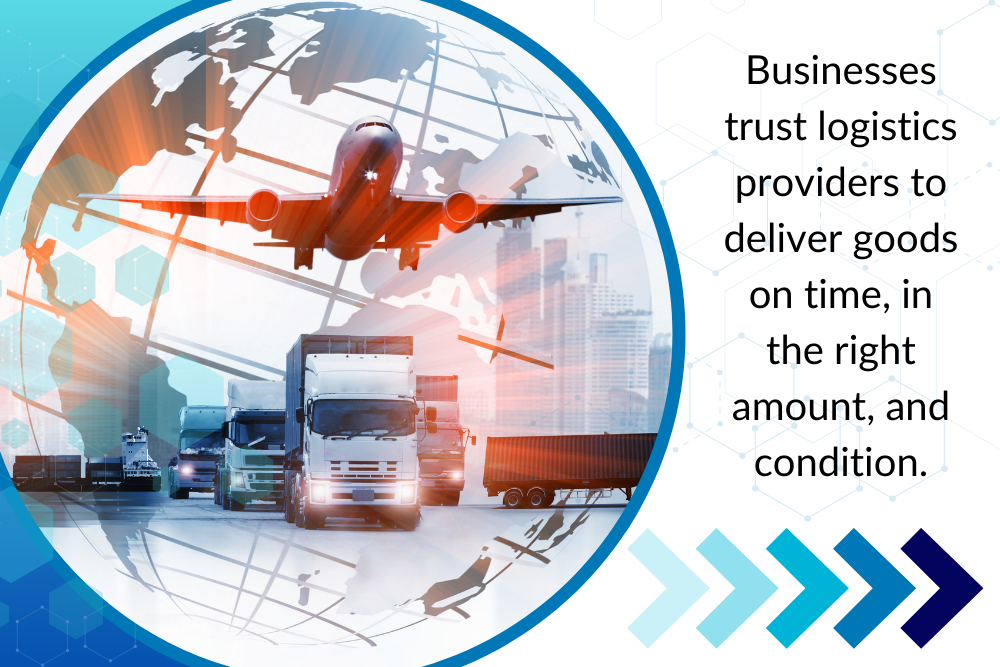
The Backbone of Business: What Logistics and Delivery Services Encompass
Logistics and delivery services form the invisible yet essential infrastructure behind modern commerce. For businesses in Singapore, these services ensure that products move smoothly, efficiently, and reliably from source to end-user.
Logistics: Planning and Coordination from End to End
At its core, logistics refers to the planning, coordination, and execution of the movement of goods across the supply chain—from sourcing raw materials to delivering finished products to customers. It involves multiple interconnected activities such as procurement, transportation, warehousing, inventory control, and order processing.
In Singapore’s fast-moving economy, effective logistics is critical for minimizing delays, reducing costs, and meeting customer expectations. Businesses rely on logistics providers to manage these functions seamlessly, ensuring that goods arrive on time, in the right quantities, and in good condition. When executed well, logistics becomes a strategic driver of efficiency and customer satisfaction.
Delivery Services: Connecting Businesses to Customers
Delivery services form the final and most visible stage of the logistics process—connecting businesses directly to their customers. This includes the physical transportation of goods from warehouses or distribution centers to the end recipient. Whether serving consumers or corporate clients, businesses rely on efficient delivery services to meet tight schedules and fulfil expectations.
In Singapore, where speed and reliability are key, having dependable delivery partners is essential to boost customer satisfaction with fast delivery. From traditional couriers to tech-driven last-mile solutions, the goal is to ensure orders arrive promptly and in perfect condition. A smooth, timely delivery experience strengthens trust and encourages repeat business.
Support Infrastructure: Warehousing, Fulfilment, and Technology
Behind logistics and delivery are support systems like warehousing, fulfilment centers, and digital platforms that ensure operations run smoothly and efficiently. These elements handle everything from storage to shipping, with inventory management playing a central role in tracking stock levels and order accuracy.
Many businesses in Singapore rely on third-party logistics (3PL) providers to manage these functions, gaining access to scalable warehousing, professional packing services, and streamlined dispatch. Fulfilment centers powered by automation and real-time data help reduce delays and improve customer satisfaction. When integrated with e-commerce or ERP systems, these support services form a reliable foundation that allows businesses to grow, adapt, and deliver consistently in a fast-paced market.
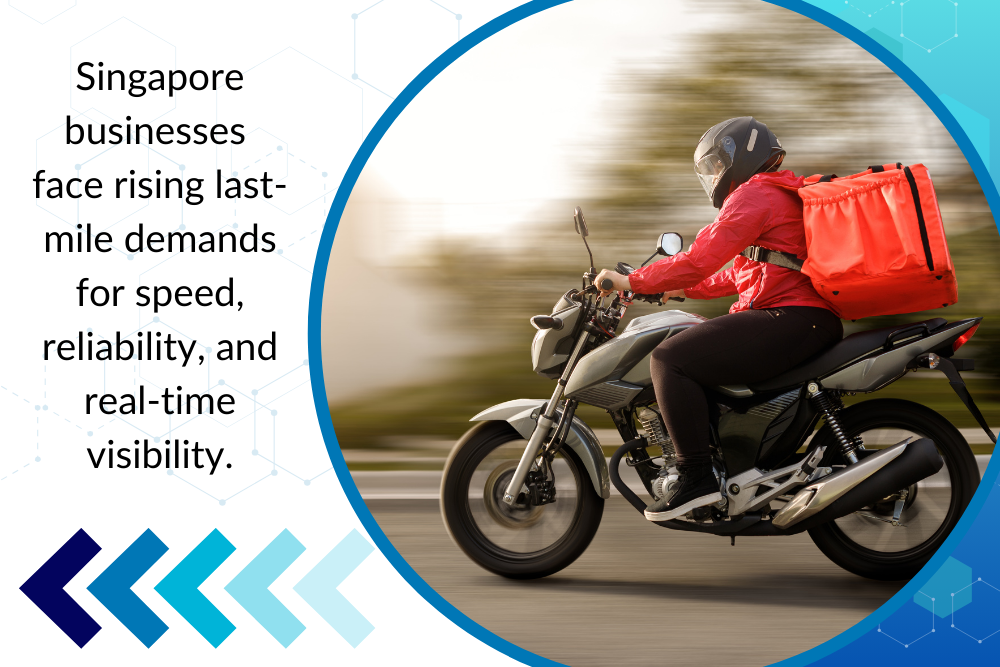
Delivery Services: Meeting Rising Expectations in the Last Mile
In today’s on-demand economy, delivery services have evolved from a back-end function to a customer-facing experience. Businesses in Singapore must now meet rising expectations around speed, reliability, and visibility—especially in the last mile.
The Importance of the Last Mile
The “last mile” refers to the final step in the delivery process, where goods are transported from a local distribution centre to the end customer. This stage is crucial, as it directly influences customer satisfaction and loyalty. Delays or errors can lead to dissatisfaction and increased operational costs due to re-deliveries or returns.
Implementing end-to-end delivery solutions ensures a seamless process from order placement to final delivery, enhancing efficiency and reliability. Additionally, adopting just-in-time delivery practices minimizes inventory holding costs and meets consumers’ expectations for prompt service. Prioritizing the optimization of the last mile is essential for businesses aiming to improve service quality and maintain a competitive edge in the market.
Evolving Delivery Models and Local Innovations
To stay competitive, businesses are rethinking how they deliver goods in increasingly dense and fast-paced cities. Innovative solutions like urban logistics hubs and smart lockers and parcel terminals are helping reduce congestion and streamline parcel collection in places like HDB estates.
Meanwhile, the rise of gig economy couriers allows for flexible, on-demand delivery options that meet consumer expectations for speed and convenience. Emerging technologies such as urban delivery drones and autonomous delivery vehicles are also being explored to future-proof operations and cut delivery times. These evolving models support more sustainable, efficient, and customer-centric last-mile strategies.
Visibility, Communication, and the Customer Experience
Modern delivery operations thrive on transparency, responsiveness, and seamless communication — all of which are now key drivers of customer satisfaction. Consumers expect to know exactly when and where their parcels will arrive, making real-time delivery tracking and advanced last-mile tracking systems essential features in any service offering.
These tools empower customers with updates at every stage, from dispatch to doorstep, while also reducing missed deliveries and service complaints. For logistics providers, enhanced visibility isn’t just about convenience — it’s a competitive edge. It fosters trust, supports better resource allocation, and strengthens overall service reliability in an increasingly demanding e-commerce landscape.
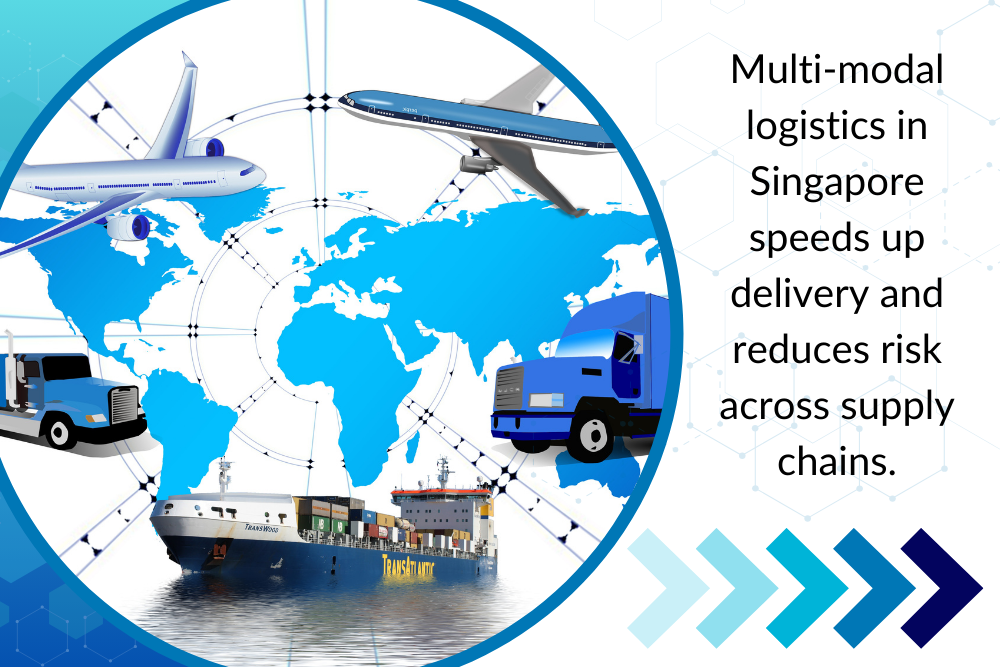
Logistics and Transportation: Streamlining the Movement of Goods
Efficient transportation lies at the heart of any successful logistics operation. For businesses in Singapore, ensuring the smooth, cost-effective movement of goods is essential to meeting customer demand and staying competitive in regional and global markets.
Multi-Modal Transport for Maximum Flexibility
Multi-modal transport combines different methods—such as sea, air, and land freight—to create faster, more cost-effective shipping routes. Logistics providers in Singapore offer multi-modal solutions that improve delivery speed, reduce transit risks, and optimize costs. For example, a business might use sea freight for bulk shipments to Johor, followed by truck transport for last-mile delivery.
These providers also manage freight forwarding services, coordinating schedules, carriers, and documentation to ensure seamless transitions between transport modes. Efficient cargo handling at ports and airports further supports this process, minimizing delays and damage while maintaining the flow of goods across the supply chain.
Route Optimization and Fleet Management
Route optimization and fleet management are essential for ensuring timely deliveries, especially in Singapore’s dense urban environment. Logistics providers use advanced tools and data analytics to streamline routes, reduce fuel consumption, and improve delivery performance. Urban logistics plays a crucial role here, helping businesses navigate traffic congestion, delivery time restrictions, and limited loading zones.
Key features include:
- Real-time GPS tracking to monitor vehicle movement and delivery status.
- Automated route planning that adjusts based on traffic, weather, and delivery priorities.
- Fleet management systems that track driver behaviour, vehicle health, and fuel efficiency.
By refining these processes, logistics providers help businesses cut costs, meet delivery windows, and operate more sustainably.
Cross-Border and Regional Distribution Capabilities
Singapore’s strategic location makes it a gateway for cross-border shipping across Southeast Asia and beyond. Logistics providers play a key role in facilitating smooth regional distribution by managing the complexities of customs clearance and regulatory compliance.
Experienced providers are well-versed in Singapore Customs procedures and use digital platforms like Tradenet to streamline trade submissions and approvals. They also handle critical compliance and documentation requirements, reducing delays and ensuring goods move efficiently across borders. By leveraging the right logistics partner, businesses can expand regionally with confidence and avoid costly disruptions in their international supply chain.
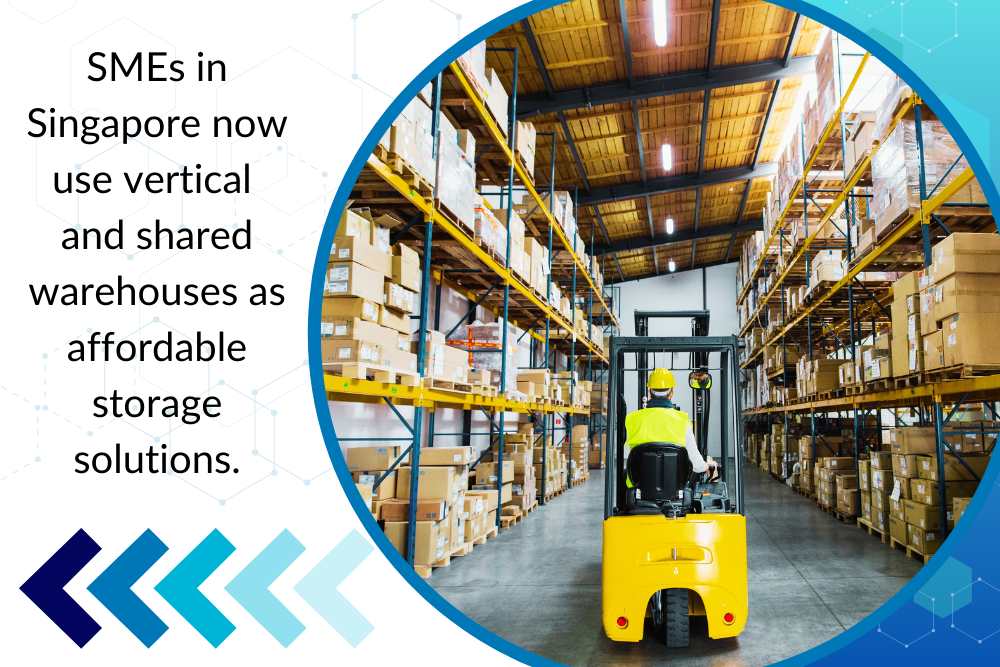
Warehousing and Fulfilment: Powering Consistency Behind the Scenes
While customers interact with your brand at the point of delivery, the real magic happens much earlier. Warehousing and fulfilment are the behind-the-scenes operations that ensure orders are processed accurately, stocked efficiently, and shipped on time.
Modern Warehousing: Beyond Storage Space
Modern warehousing has evolved far beyond traditional storage. Today, it plays a critical role in warehousing and distribution, supporting faster order processing and higher inventory accuracy. Advanced inventory management systems allow businesses to monitor stock levels in real time, automate replenishment, and reduce holding costs. Some facilities now use robotics in warehousing—automated guided vehicles (AGVs) and robotic arms—to speed up picking and improve efficiency.
In space-scarce Singapore, vertical warehousing and shared facilities have become popular affordable warehousing services for SMEs. According to Enterprise Singapore, shared logistics spaces are helping smaller businesses lower costs and remain agile in a highly competitive landscape. These innovations make warehousing a strategic asset, not just a storage solution.
Fulfilment Services: Picking, Packing, and Dispatching
Fulfilment services cover the entire process of preparing and shipping customer orders—commonly referred to as order fulfilment. This includes verifying orders, picking items from inventory, securely packing them, and dispatching them for delivery.
Many businesses in Singapore partner with 3PL providers that operate dedicated fulfilment centers, allowing them to streamline operations without managing these tasks in-house. These centers are equipped to handle large volumes efficiently and often offer value-added services like custom packaging or gift wrapping.
In addition, 3PLs manage vendor coordination, ensuring that inbound goods from suppliers are properly received and stocked. They also handle reverse logistics, managing returns and exchanges with minimal disruption. By outsourcing fulfilment, businesses can ensure accuracy, reduce shipping delays, and deliver a smoother customer experience from start to finish.
Technology and Integration for Real-Time Control
In today’s fast-paced market, leveraging advanced technology is essential for businesses aiming to enhance their warehousing and fulfilment operations. Implementing integrated logistics systems—which unify processes like transportation, warehousing, and order processing—can lead to significant improvements in efficiency and cost reduction. By streamlining these components, companies can eliminate redundancies and optimize workflows, resulting in substantial cost savings.
Furthermore, adopting omnichannel fulfilment strategies enables businesses to meet customer demands across multiple sales channels seamlessly. This approach not only enhances customer satisfaction but also drives increased revenue. Notably, marketing campaigns employing an omnichannel approach report a remarkable 494% higher order rate compared to those launched on a single channel.
By integrating these technological advancements, businesses can achieve real-time control over their supply chain, ensuring agility and responsiveness in a competitive landscape.
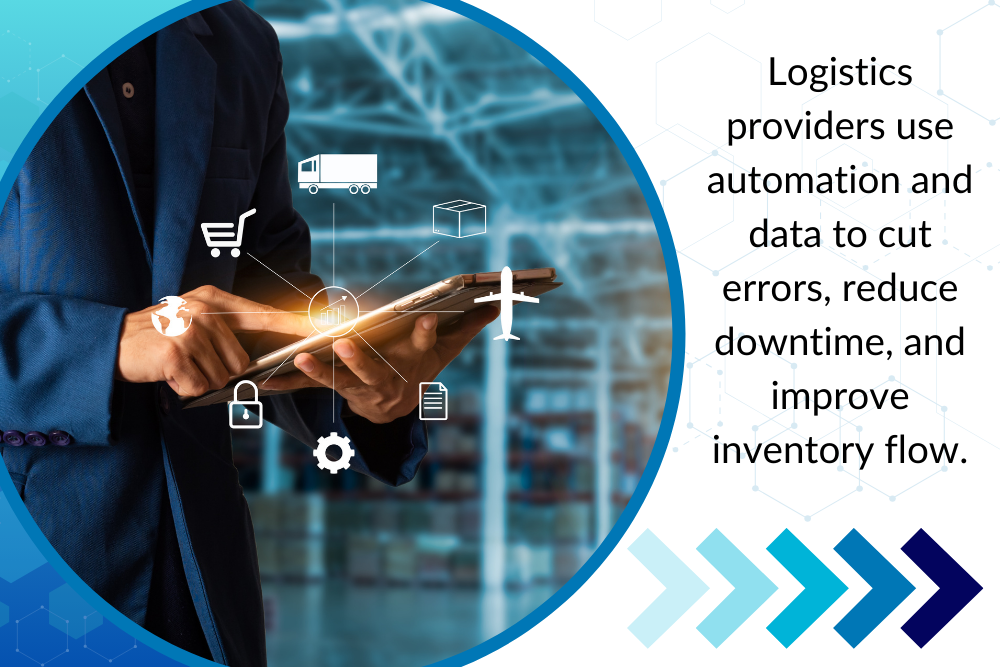
Core Business Benefits: Why Businesses in Singapore Should Embrace These Services
Logistics and delivery services in Singapore offer more than just transport—they unlock growth, efficiency, and resilience. From real-time delivery tracking to affordable warehousing services, these solutions help businesses streamline operations and stay competitive in a fast-moving market.
Operational Efficiency and Cost Savings
Outsourcing logistics and delivery operations can significantly boost efficiency while reducing overhead costs. Businesses no longer need to invest in building their own warehouse infrastructure, hiring delivery staff, or managing transport fleets. Instead, they gain access to established networks, optimized workflows, and specialized expertise. Affordable warehousing services, shared transportation routes, and bulk shipping rates help lower fixed and variable expenses.
Additionally, logistics providers use data and automation to minimize errors, reduce idle time, and streamline inventory turnover. This level of operational efficiency allows businesses to focus on core activities, improve productivity, and scale more sustainably—without the burden of high logistical costs.
Scalability and Faster Time-to-Market
Logistics providers offer the flexibility businesses need to grow without being weighed down by infrastructure constraints. Whether you’re launching a new product, entering new markets, or handling seasonal spikes, these providers can quickly scale warehousing, transport, and fulfilment support to meet changing demands.
This agility shortens lead times and accelerates time-to-market—crucial advantages in Singapore’s competitive and fast-moving economy. By partnering with a scalable logistics network, businesses can seize new opportunities, respond to demand shifts, and expand with confidence and control.
Enhanced Customer Experience and Reliability
A smooth and dependable delivery experience is key to building customer trust and loyalty. Logistics providers help ensure that products arrive on time, in good condition, and with minimal errors. Real-time delivery tracking and flexible delivery options give customers the control and transparency they expect. Additionally, reliable fulfilment processes reduce missed deliveries and returns. By partnering with experienced providers, businesses can consistently meet or exceed customer expectations—turning great service into a powerful competitive advantage.
Compliance, Safety, and Real-Time Visibility
Operating in Singapore requires strict adherence to regulatory standards, particularly in sectors such as food, healthcare, and electronics. Professional logistics providers help businesses stay compliant by managing the complex requirements of compliance and documentation, reducing the risk of costly delays or legal issues.
These providers are well-versed in local and international regulations, ensuring that goods move smoothly through each checkpoint. In addition, many offer real-time visibility into shipments and inventory, giving businesses greater control and accountability. This proactive approach not only minimizes operational disruptions but also builds trust with customers and regulatory authorities alike.
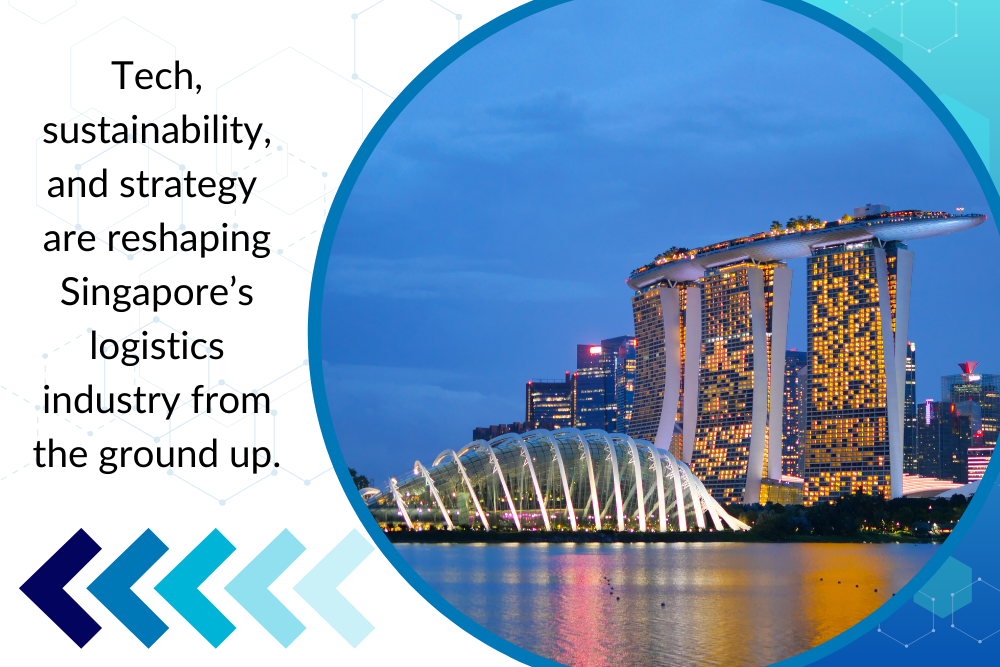
Industry Trends Shaping the Future of Logistics and Delivery Services
Singapore’s logistics sector is undergoing significant transformations, driven by technological advancements, sustainability initiatives, and strategic developments. These trends are reshaping the industry, positioning Singapore as a leading global logistics hub.
Artificial Intelligence (AI) Integration
AI in logistics is transforming how businesses plan, execute, and optimize supply chain operations. From demand forecasting to route optimization, AI-powered tools enable faster, data-driven decisions that improve efficiency and reduce costs. In Singapore, 57% of organizations are prioritizing AI adoption—the highest rate in Asia—creating fertile ground for logistics innovation. The government’s strong support, including SGD 150 million under the Enterprise Compute Initiative, is accelerating these advancements and encouraging more AI applications in logistics across the industry, especially among forward-looking logistics providers.
Sustainable Logistics Practices
Sustainability in logistics (EVs, carbon-neutral delivery) is now a key priority in Singapore’s logistics industry. Companies are adopting eco-conscious strategies, including electric delivery vehicles (EVs), carbon-neutral delivery programs, optimized routing, and energy-efficient warehousing. These efforts reflect a broader shift toward minimizing environmental impact while aligning with rising consumer and regulatory expectations for responsible operations. Platforms like OptETruck, for example, leverage AI to automate logistics planning and are projected to eliminate 10 million kilograms of CO₂ emissions annually.
E-Commerce Expansion and Last-Mile Delivery Innovations
The rapid growth of online shopping has pushed logistics providers to evolve their e-commerce logistics strategies. In Singapore, where speed and convenience are top priorities, businesses are adopting real-time delivery tracking, automated parcel systems, and even drone delivery to meet customer expectations. Urban logistics plays a key role in navigating tight delivery windows and dense cityscapes. These innovations help ensure faster, smarter last-mile delivery—critical for staying competitive in Singapore’s booming digital commerce landscape.
Government Initiatives and Infrastructure Development
The Singaporean government is actively supporting the logistics sector through various initiatives. The Logistics Industry Transformation Map aims to add 2,000 new Professionals, Managers, Executives, and Technicians (PMET) jobs by 2025, reflecting a commitment to workforce development. Additionally, significant infrastructure projects like the Tuas Mega Port, set to be the world’s largest fully automated terminal upon completion, underscore Singapore’s dedication to enhancing its logistics capabilities and reinforcing its position as a global logistics hub.
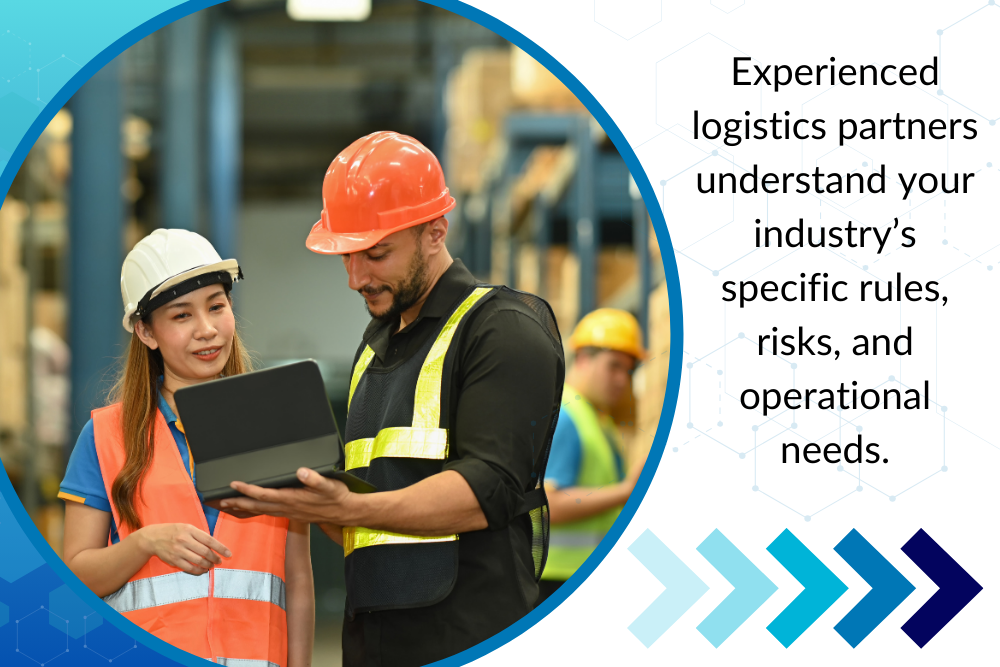
Choosing the Right Partner: What to Look for in a Logistics Provider
Selecting the right logistics provider is a pivotal decision that can significantly influence your business’s efficiency and customer satisfaction. In Singapore’s dynamic market, understanding key factors in this selection process is essential for fostering a successful partnership.
Industry Expertise and Reputation
When you’re looking to choose the right logistics partner, industry expertise and a solid reputation are essential. A provider with proven experience in your sector will understand the unique challenges, regulations, and operational nuances your business faces. Whether you operate in retail, manufacturing, or healthcare, partnering with a logistics company that knows your industry ensures smoother workflows and better results.
It’s also important to assess their track record—look for positive client testimonials, long-term partnerships, and successful case studies. Experienced providers often bring proactive problem-solving skills and valuable insights that go beyond standard service delivery. By choosing a trusted partner with deep industry knowledge, you reduce risks, improve reliability, and gain a competitive edge in your supply chain operations.
Comprehensive Service Offerings
An ideal logistics partner should provide more than just transport—they should offer comprehensive service offerings that support your entire supply chain. This includes services that ensure operational efficiency and flexibility as your business evolves.
Look for providers that offer:
- End-to-end delivery solutions covering warehousing, distribution, and last-mile delivery
- Customs clearance support for smooth cross-border transactions and regulatory compliance
- Logistics scalability that allows you to adapt quickly to seasonal demand, market expansion, or product launches
- Integrated logistics systems that connect inventory, order fulfilment, and delivery into a single, real-time platform
These features reduce the need for multiple vendors, improve accountability, and streamline communication across supply chain functions. Choosing a logistics partner with this range of services positions your business for long-term success and operational agility.
Technological Capabilities and Customer Support
Technological capabilities are a key differentiator when selecting a logistics provider. The right partner should offer tools that enhance operational efficiency and give you better control over your supply chain. Features like real-time tracking, automated alerts, and seamless platform integration improve visibility and reduce delays. Advanced systems also support accurate inventory management, helping businesses avoid overstocking or stockouts.
Providers that offer route optimization can shorten delivery times and reduce fuel costs—especially valuable in Singapore’s urban environment. Additionally, some logistics partners use demand forecasting tools powered by AI to anticipate customer needs and adjust logistics operations accordingly. Combined with responsive customer support, these technologies create a reliable and agile logistics experience tailored to your business goals.
Don’t let logistics hold your business back. Discover the advantages of working with trusted delivery experts. Explore Becozon and browse our top-rated logistics and delivery service providers in Singapore and take your operations to the next level.
Latest Becozon Offer
Boost your business with these exclusive deals by our esteemed Becozon partners
Looking for a CRM software?
Get customisable, cloud-based sales and operations CRM software suitable for any industry. Contact us for a demo today!
Contact Us




